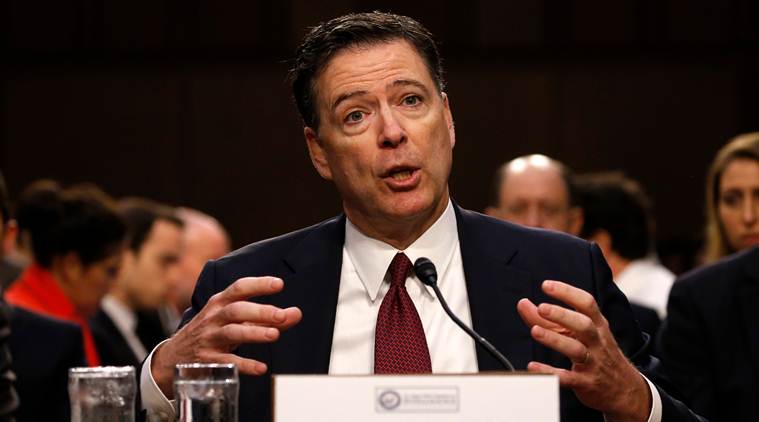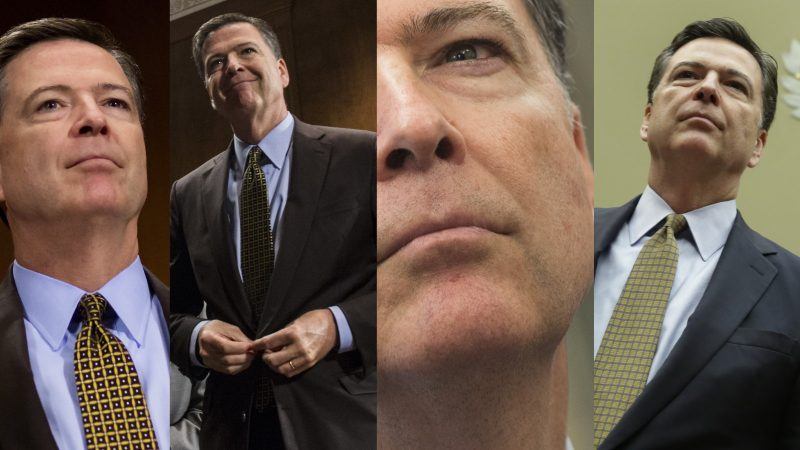
Former FBI Director James Comey spent three hours on Thursday answering questions, while also consistently defending himself against the recent onslaught of President Donald Trump‘s attacks on his character.
The main takeaways from his testimony were expected as he had released his written testimony on Wednesday. He just filled in plenty of blanks on Thursday.
You can read the full transcript of Thursday’s hearing here. It’s a long one, but you can see a pattern with several Republican Senators along with the Democrats.
Someone at the White House must have wrestled Trump’s phone from him as he remained Twitter silent for all of Thursday.
- “Lies, plain and simple.”
Comey testified that President Donald Trump lied when announcing the firing of the then-FBI director due to low morale.
Comey testified his firing was due to his refusal to drop the Russia investigation and for not pledging his loyalty to the president.
“Those were lies, plain and simple,” Comey testified. “The president and I had had multiple conversations about my job, both before and after he took office, and he had repeatedly told me I was doing a great job, and he hoped I would stay.”
The White House adamantly denied both of Comey’s accusations ever taking place.
- Unprecedented meetings… and detail.
Comey said as FBI director, he felt the need to chronicle his private meetings with Trump in unprecedented detail.
While meeting with President Barack Obama twice in three years and with President George W. Bush once, the FBI director met with Trump a total of nine times, Comey testified.
A meeting on Jan. 6 at Trump Tower to brief the president on the Russia investigation led to Comey feeling “compelled” to document their conversations, since the investigation was related to his campaign.
“First, I was alone with the president of the United States, or the president-elect, soon to be president, and then the nature of the person,” Comey said. “I was honestly concerned he might lie about the nature of our meeting, so I thought it important to document. That combination of things I had never experienced before, but had led me to believe I got to write it down and write it down in a very detailed way.”
- Comey leaked his own story to the press
Arguably the most damning moment was when Comey said he leaked contents of a memo about his conversation with Trump to the New York Times through a friend, later identified as Columbia University law professor Daniel Richman.
Comey wanted to get his account out, encouraging the appointment of a special prosecutor, now former FBI director Robert Mueller.
“My judgment was, I need to get that out into the public square,” Comey testified. “I asked a friend of mine to share the content of the memo with a reporter. Didn’t do it myself for a variety of reasons. I asked him to because I thought that might prompt the appointment of a special counsel.”
The president’s lawyer is accusing Comey of “unauthorized disclosures” and will “leave it the appropriate authorities” to determine whether the leak should be investigated.
- Grilling across party lines
Both Republicans and Democrats intensely questioned Comey about his private interactions with Trump.
Comey testified the president asked him to drop the FBI investigation into former National Security Advisor Michael Flynn, who resigned over engagements with Russia.
A gross conflict given the FBI is obligated to remain independent of the White House.
“Why didn’t you stop and say, ‘Mr. President this is wrong’?” asked Sen. Diane Feinstein, D-California.
“It’s a great question. Maybe if I were stronger, I would have. I was so stunned by the conversation that I just took in,” Comey testified. “Maybe if I did it again, I’d do it better.”
James Comey better hope that there are no "tapes" of our conversations before he starts leaking to the press!
— Donald J. Trump (@realDonaldTrump) May 12, 2017
- “Lordy, I hope there are tapes”
It’s still unknown if there are recordings of Comey’s private meetings in the Oval Office. Trump eluded to the possibility in a tweet last month.
During Thursday’s testimony, Comey told the Senate Intelligence Committee “Lordy, I hope there are tapes.”
A White House spokesperson said she had “no idea” if the president is taping his Oval Office conversations, but sarcastically said they will “try to look under the couch.”
The White House’s statements were “lies, plain and simple.” Comey took notes on their conversations because he worried the president “might lie” later. After a while, he said, he so distrusted the man running the country that he did not want to be left alone with him.
It was a riveting, televised portrait of President Donald Trump, one unrivaled in recent memory for its potential to undermine the presidency. Comey’s message, delivered in meticulous detail, amounted to a challenge to lawmakers, the public and the special counsel now investigating possible links between Trump’s campaign and Russia: Whose account do you believe – the nation’s former top law enforcement official testifying under oath or a president with a record of skirting the truth on issues big and small?
The answer to that question ultimately may not impact the outcome of the FBI and congressional Russia probes, and it may not move Republican lawmakers any closer to a dramatic break from their party leader. But it could leave the president in a perilously weak political position not yet five months into his term.
“A president cannot communicate effectively if their trust tank is full of holes and credibility has leaked out all over the political landscape,” said Matthew Dowd, who served as chief strategist for President George W. Bush’s re-election campaign.
A Gallup poll conducted in April found that just 36 percent of Americans found Trump “honest and trustworthy” – down from 42 percent in February.
The White House and the president’s personal lawyer vigorously vouched for Trump’s integrity, saying he did not try to get the FBI to end the Michael Flynn investigation and also did not seek a loyalty pledge from Comey. Both were quick to note that Comey validated one Trump claim: that Comey had told him three times that he was not personally the target of the investigation.
“I can definitively say the president is not a liar, and I think it’s frankly insulting that question would be asked,” spokeswoman Sarah Huckabee Sanders said.
Comey himself is a controversial figure. He outraged Democrats last year with his handling of the investigation into Hillary Clinton‘s email practices, including the decision to publicly disclose the potential of new information 10 days before the election. During his final appearance on Capitol Hill as FBI director, he vastly overstated the number of emails that were uncovered late in the campaign, prompting the bureau to correct his testimony.
Still, it was telling that few Republicans who don’t work for Trump stepped in to defend the president’s version of his contacts with the former FBI director. The toughest questioning of Comey by GOP lawmakers on the Senate intelligence committee focused more on whether the interactions he described amounted to legal trouble for Trump than on whether he was telling the truth about the nine meetings and phone calls he had with the president.
Instead, some supportive GOP lawmakers simply argued that Trump’s action were a result of well-meaning inexperience or dedication to his aides.
“I’m frankly proud of him for standing up for someone who was as loyal as Mike Flynn was throughout the campaign,” Rep. Chris Collins, R-N.Y., said of Comey’s dramatic depiction of an Oval Office meeting in which Trump allegedly said he hoped the FBI would let the Flynn investigation go. Collins spoke after the prepared text of Comey’s opening statement was released Wednesday.
House Speaker Paul Ryan also did not dispute Comey’s assertions. He vouched for the importance of the FBI’s independence and excused Trump’s blurring of that line as missteps by a man who isn’t “steeped in the long-running protocols” that govern the relationship between the White House and the law enforcement agency.
“The president’s new at this. He’s new at government,” Ryan told reporters on Capitol Hill as Comey’s dramatic testimony unfolded. “He’s learning as he goes.”
Yet, Trump’s own track record – as president, a candidate and private citizen – make the questions about the veracity of his own words impossible for the White House to avoid. He memorialized his approach to accuracy in his 1987 book “The Art of the Deal,” writing: “People want to believe that something is the biggest and the greatest and the most spectacular. I call it truthful hyperbole.”
Trump’s shift from real estate mogul and reality TV star to political powerhouse was driven in part by his campaign to spread the lie that President Barack Obama was born outside the United States. He spent his first full day occupying the world’s most powerful office inflating the size of the inaugural crowd and demanding that his advisers do the same. Last month, he created a voter fraud commission to investigate “millions of people who voted illegally,” despite there being no proof of such fraudulent voting.
The president’s abrupt firing of Comey on May 9 – and the White House’s bungled handling of the controversial move – has intensified questions about Trump’s credibility. At first, the White House cited a harsh memo about Comey’s performance from Deputy Attorney General Rod Rosenstein as the justification, though Trump later said he would have fired Comey regardless of what the Justice Department recommended.
When Comey allies began fighting back with negative stories about Trump in the press, the president issued a startling warning on Twitter: “James Comey better hope that there are no ‘tapes’ of our conversations before he starts leaking to the press!”
The White House has avoided all questions about whether such tapes exist. But Comey confidently asserted that if there are recordings, they will back up his testimony.
“Lordy, I hope there are tapes,” Comey said.


